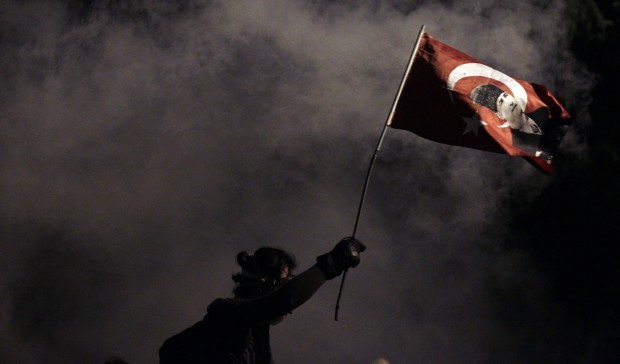
A protester holding a Turkish flag decorated with the image of former leader Mustafa Kemal Atatürk during clashes near Taksim Square in Istanbul on June 3, 2013. (AP Photo/Kostas Tsironis)
London, Asharq Al-Awsat—The state of Turkish journalism and government restrictions on the freedom of the press remain in the spotlight, with one media advocacy group accusing Ankara of waging the “world’s biggest crackdown” on media freedoms.
In exclusive comments to Asharq Al-Awsat, Ricardo Gutiérrez, the general secretary of the European Federation of Journalists (EFJ), said: “Turkish journalists are deeply concerned about the restrictions being imposed on their profession, which in many cases includes arbitrary detention and restrictions on the freedom of the press.”
Gutiérrez said that Ankara appears indifferent to press freedom, adding that government censorship is being practiced against all journalists, regardless of age or background. He cited the case of a 22-year-old student of journalism who is currently being detained by the government and facing terrorism charges. In addition to this, 44 other journalists have faced similar charges over the past two weeks.
The EFJ general secretary affirmed that the European community is attempting to pressure the Turkish government to lift restrictions on the press, notably by sending delegations to monitor trials.
Gutiérrez added that the state of fear among Turkey’s journalists and media organizations precludes the launching of an effective resistance or protest movement.
In a report issued last month, the New York-based Committee to Protect Journalists (CPJ) issued an open letter to Prime Minister Recep Tayyip Erdoğan’s government, criticizing a number of government policies towards the media. The CPJ cited “the continued jailing of journalists in retaliation for their work, and the linkage of reporting that challenges government policies with terrorism,” in addition to “the heated anti-press rhetoric coming from the top echelons of power that emboldens zealous prosecutors to go after critics, and causes jittery media owners to clear their newsrooms of independent voices in order to protect their businesses.”
The CPJ also made reference to “attempted government-sanctioned censorship of sensitive topics and news events” and “the official threats to restrict Turkey’s social media,” in addition to “the crackdown on journalists and media outlets in retaliation for their independent or pro-opposition coverage of June’s anti-government rallies.”
More than 85 journalists were sacked or forced to resign since the May 31 Gezi protests, according to Turkish journalists’ union leader Ercan İpekçi.
In comments to Agence France-Presse (AFP), CPJ executive director Joel Simon confirmed that journalists covering the Gezi protests “became frequent targets of police abuse.”
“But most mainstream journalists don’t fear being beaten or jailed. Instead, they fear losing their jobs,” he added.
The CPJ open letter called on the Erdoğan government to “release all journalists held in pre-trial detention without delay” and to “review the cases of journalists behind bars, including ones who have already been convicted under broad anti-terror laws and penal code charges.”
